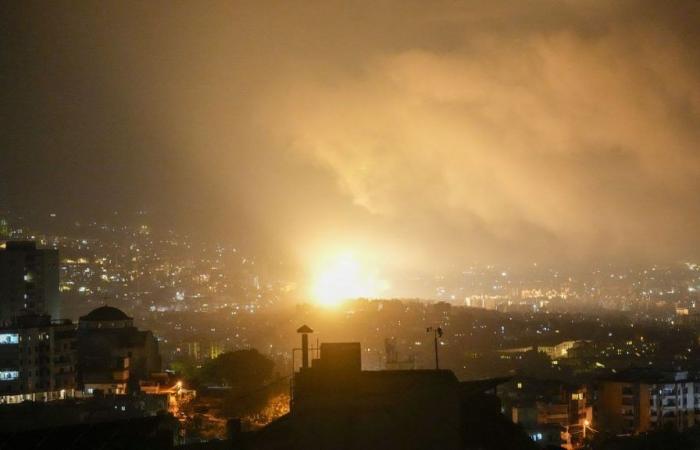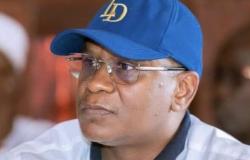The army said it carried out a precise airstrike as Hezbollah leaders were meeting at their headquarters in Dahiyeh, south of Beirut.
ADVERTISEMENT
The Israeli military said Saturday it had killed Hassan Nasrallah, the leader of the militant group Hezbollah, in a strike in Beirut on Friday.
The army said it carried out a precise airstrike as Hezbollah leaders were meeting at their headquarters in Dahiyeh, south of Beirut.
Ali Karki, the commander of Hezbollah’s Southern Front, and other Hezbollah commanders were also killed in the attack, the Israeli military said. Lebanon’s health ministry said six people were killed and 91 injured in Friday’s strikes, which flattened six apartment buildings.
Mr. Nasrallah has led Hezbollah for more than thirty years. Nasrallah has been in hiding for years, rarely appearing in public, with his speeches usually broadcast by video from unknown locations. Hezbollah had no immediate comment.
Israel maintained an intensive barrage of airstrikes against Hezbollah on Saturday, as Hezbollah launched dozens of rockets toward Israel.
Mobilization in Israel amid tensions with Lebanon
The Israeli military said it was mobilizing additional reserve soldiers due to escalating tensions with Lebanon. The army said Saturday morning it was activating three battalions of reserve soldiersafter sending two brigades to northern Israel earlier this week to train for a possible ground invasion.
On Saturday morning, the Israeli army carried out several strikes in southern Beirut and the Bekaa Valley in eastern Lebanon. Hezbollah launched dozens of projectiles into northern and central Israel as well as the Israeli-occupied West Bank.
In Beirut’s southern suburbs, smoke billowed and streets were empty after the area was pounded overnight by intense Israeli airstrikes. The shelters set up in the city center for displaced people were full to capacity. Many families slept in public squares, beaches or in their cars. On the roads leading to the mountains above the capital, hundreds of people could be seen fleeing on foot, carrying small children and whatever they could carry.
At least six people were killed and 91 injured in strikes against Hezbollah on Fridayaccording to the Lebanese Ministry of Health. It was the largest explosion to hit the Lebanese capital in the past year and appears likely to bring the escalating conflict closer to a full-blown war. According to the Health Ministry, at least 720 people were killed in Lebanon during the week.
The toll is likely to rise considerably as teams search the rubble of six buildings. Israel launched a series of strikes on other areas of the southern suburbs following the initial explosion.
Borrell warns of danger of ‘total war’, Tehran restrained
Earlier, EU foreign policy chief Josep Borrell warned that the Middle East was heading towards “total war” on the same evening that Israel launched airstrikes on Hezbollah headquarters in Beirut , the Lebanese capital.
Speaking to reporters in New York after a UN Security Council session on Gaza, Borrell lamented that no power seemed able to “stop” Benjamin Netanyahu, adding that the Israeli prime minister seemed determined to crush militants in Lebanon and Gaza at all costs.
“If the interpretation of destruction is the same as that of Hamas, then we are going to embark on a long war,” he said, quoted by the AFP news agency.
“This targeting confirms one thing: today, all Lebanese are targeted. Today, all Lebanese are targeted. The Israeli enemy does not differentiate between military personnel and civilians,” declared Jad Fayyad, a resident of the region.
The Iranian embassy in Beirut condemned the strikes, saying they “represent a serious escalation that changes the rules of the game.”
She also said Israel would be “punished appropriately.”
But in New York, during a visit to the United Nations earlier this week, Iranian President Massoud Pezechkian appeared to suggest that Tehran was not interested in escalationdeclaring that a wider war in the Middle East “wouldn’t benefit anyone.”
In a sign of the importance of the strike, Prime Minister Benjamin Netanyahu abruptly cut short a visit to the United Statesdeciding to return to Israel immediately instead of waiting until the end of Shabbat, Saturday evening, as had initially been planned.
Israeli politicians do not normally travel on Shabbat except for matters of great importance.
Hours earlier, Mr. Netanyahu had vowed that Israel’s campaign against Hezbollah would continue, dashing hopes of an internationally-backed ceasefire.
Israeli army spokesman Rear Admiral Daniel Hagari openly stated that the strikes that hit the Lebanese capital targeted Hezbollah’s main headquarters, located under residential buildings.
Israel significantly stepped up its airstrikes in Lebanon this week, saying it was ending 11 months of Hezbollah fire into its territory.
Israel and Hezbollah have exchanged cross-border fire almost daily since the Gaza war began in October last year. Hezbollah says its attacks on Israel will stop when a ceasefire is reached with Hamas.
Although the exact scope of the Israeli operation remains unclear, officials have said a ground invasion aimed at pushing the militant group away from the border is possible.
Additionally, Israel moved thousands of troops to the border this week in preparation.
Israeli strikes this week have killed more than 720 people in Lebanon, including dozens of women and children, according to statistics collected by the Health Ministry.






